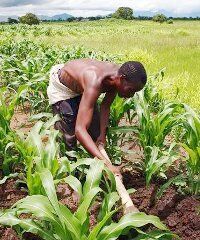By Burnett Munthali
For the first time in several years, the country’s ability to feed its citizens was at risk. Sadly and unexpectedly, Malawi lost its hard-earned status as an agricultural success story — it used to produce enough maize for its people to eat and still provide a surplus to neighbours.
Malawi, a country endowed with fertile land and a favorable climate for agriculture, faces significant challenges in ensuring food security for its population. The question of whether Malawi can sustainably feed itself three meals each day is complex and multifaceted, involving various socio-economic, environmental, and political factors.

Agriculture is the backbone of Malawi’s economy, employing about 80% of the population and contributing approximately 30% to the national GDP. The country primarily relies on subsistence farming, with maize being the staple crop. However, despite its agricultural potential, Malawi has struggled with food insecurity, exacerbated by various challenges.
Firstly, Malawi is highly vulnerable to climate change, experiencing erratic weather patterns, prolonged dry spells, and excessive rainfall. These climate-induced challenges have led to inconsistent crop yields, making it difficult for farmers to produce enough food to meet their needs.
Secondly, the heavy dependence on maize as the primary food source poses a risk. When maize production fails due to drought or floods, the entire food system is threatened. Diversifying agricultural production by promoting other crops such as legumes, fruits, and vegetables could enhance food security.
Thirdly, many Malawians live below the poverty line, limiting their access to food. Economic instability, inflation, and rising food prices further exacerbate the situation, making it challenging for families to afford three meals a day.
Fourthly, poor infrastructure hampers farmers’ ability to transport their produce to markets, leading to post-harvest losses. Additionally, limited access to agricultural inputs such as seeds, fertilizers, and irrigation facilities hinders productivity.
Fifthly, policy decisions and governance issues can impact agricultural productivity and food security. Inconsistent agricultural policies and lack of support for smallholder farmers can undermine efforts to achieve self-sufficiency in food production.
Despite these challenges, there are initiatives aimed at improving food security in Malawi:
1) The Malawian government has implemented various programs to enhance agricultural productivity, including the Farm Input Subsidy Program (FISP) to provide farmers with affordable inputs.
2) Many communities are adopting sustainable farming practices, including conservation agriculture, agroforestry, and crop diversification. These practices can improve soil health, increase resilience to climate change, and enhance food production.
3) Various non-governmental organizations and international agencies are working in Malawi to promote food security through education, capacity building, and investment in agricultural development.
In conclusion, while Malawi has the potential to feed itself three meals a day, achieving this goal requires concerted efforts from the government, local communities, and international partners. Addressing the challenges of climate change, economic constraints, and agricultural policies is crucial for enhancing food security. By promoting sustainable farming practices and diversifying crop production, Malawi can work towards a future where all its citizens have access to sufficient, nutritious food every day. The journey towards self-sufficiency in food production is ongoing, but with commitment and collaboration, it is an attainable goal for the nation.


